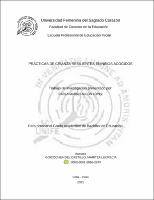| dc.contributor.advisor | Goicochea Del Castillo, Maritza Lucrecia | |
| dc.contributor.author | Falcón López, Carla María | |
| dc.date.accessioned | 2021-09-02T21:14:31Z | |
| dc.date.available | 2021-09-02T21:14:31Z | |
| dc.date.issued | 2021 | |
| dc.identifier.uri | http://hdl.handle.net/20.500.11955/855 | |
| dc.description.abstract | Esta investigación busca promover las prácticas resilientes como una herramienta para la reconstrucción afectiva y socioemocional en niños de acogida. Teniendo en cuenta, que estos niños han sufrido una separación abrupta que impactará en la formación de los vínculos que establezcan durante toda su vida. Esta separación es causada, generalmente, por el abandono, el fallecimiento de uno de sus padres o el maltrato. Dada esta problemática, es importante que el proceso de acogida de estos niños se dé bajo la mirada de una crianza basada en la resiliencia. Ya que, es necesaria una reestructuración del apego que le permita establecer vínculos con la nueva figura de referencia, la cual deberá ser resiliente, ya sea, dentro de un contexto institucional o familiar. Además, es trascendental que este nuevo contexto sea positivo, ya que, si se volviera a impactar negativamente en lo antes mencionado, las consecuencias para el desarrollo del niño podrían ser muy graves. Es necesario que las prácticas de crianza se desarrollen desde un enfoque resiliente que permita a los niños de acogida desarrollarse positivamente. | es_PE |
| dc.description.abstract | This research promotes the resilient practices as an implement to reconstruct the affective and socioemotional skills of foster children. Because they have suffered an unexpected affective separation, it going to impact in the development of their emotional ties, generally caused by abandonment, the death of one of their parents or abuse. In consequence, fostering is important to these children and it has to been based on resilience. Repair this attachment is necessary, because the child will be allowed to establish new links with the new figure of reference, who must be resilient, either within an institutional or family context. In addition, it is important a new positive context, because if it impacts negatively in the child, it could produce serious consequences in his development, like leading with an affective disorder. That are some of the reasons why it is necessary that the resilience has to be transformed into actions. It will allow foster children to develop in a positive way. | es_PE |
| dc.description.uri | Trabajo de investigación | |
| dc.format | application/pdf | es_PE |
| dc.language.iso | spa | es_PE |
| dc.publisher | Universidad Femenina del Sagrado Corazón | es_PE |
| dc.rights | info:eu-repo/semantics/openAccess | es_PE |
| dc.rights.uri | https://creativecommons.org/licenses/by-nc-nd/4.0/ | es_PE |
| dc.source | Repositorio Institucional - UNIFÉ | |
| dc.subject | Crianza del niño | es_PE |
| dc.subject | Resiliencia (Psicología) | es_PE |
| dc.subject | Niño abandonado | es_PE |
| dc.subject | Child rearing | |
| dc.subject | Resilience (Personality trait) in children | |
| dc.subject | Abandoned children | |
| dc.subject | Educación--Trabajo de Investigación | es_PE |
| dc.title | Prácticas de crianza resilientes en niños acogidos | es_PE |
| dc.type | info:eu-repo/semantics/bachelorThesis | es_PE |
| thesis.degree.name | Bachiller en Educación | es_PE |
| thesis.degree.grantor | Universidad Femenina del Sagrado Corazón. Facultad de Ciencias de la Educación | es_PE |
| thesis.degree.level | Bachiller | es_PE |
| thesis.degree.discipline | Educación Inicial | es_PE |
| dc.subject.ocde | https://purl.org/pe-repo/ocde/ford#5.03.01 | es_PE |
| renati.advisor.dni | 07773705 | |
| renati.advisor.orcid | https://orcid.org/0000-0001-5856-224X | es_PE |
| renati.author.dni | 74608220 | |
| renati.discipline | 111016 | es_PE |
| renati.juror | Goicochea Del Castillo, Maritza Lucrecia | es_PE |
| renati.juror | Melloh Navarro, Patricia Dorotea | es_PE |
| renati.level | https://purl.org/pe-repo/renati/level#bachiller | es_PE |
| renati.type | http://purl.org/pe-repo/renati/type#trabajodeInvestigacion | es_PE |
| dc.publisher.country | PE | es_PE |


